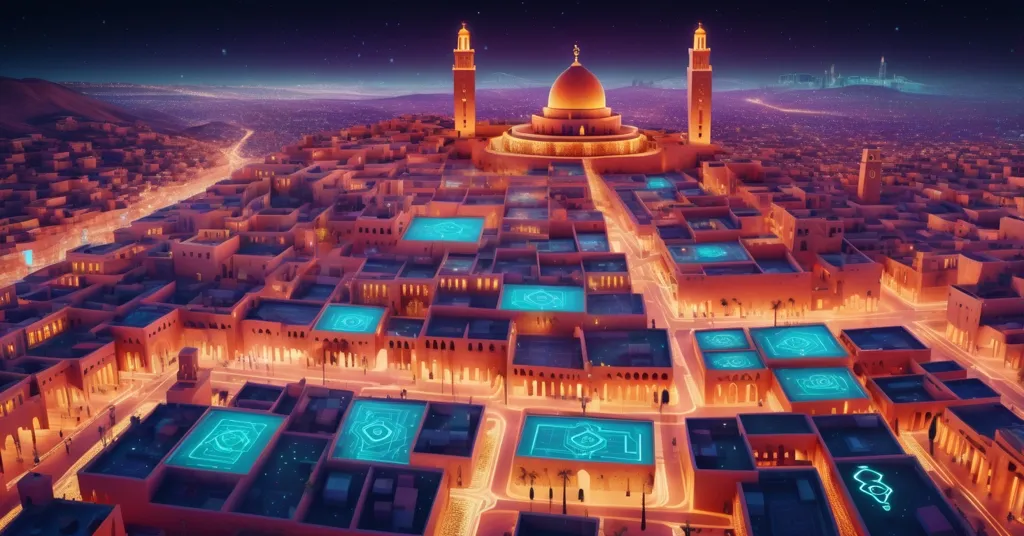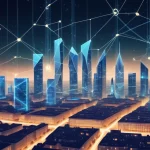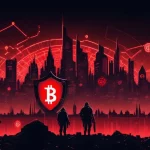Morocco Targets 10% GDP Boost by 2030 with Blockchain and AI

Morocco’s Ambitious Leap: Aiming for 10% GDP Growth Through Blockchain and AI by 2030
Morocco is boldly stepping into the future with its “Digital Morocco 2030” strategy, targeting a significant 10% GDP boost by the end of the decade, driven by the transformative power of blockchain and artificial intelligence (AI). This ambitious plan not only aims to enhance the digital economy but also promises to create jobs and revolutionize government services. With a previous ban on digital assets now giving way to widespread adoption, Morocco is pushing boundaries in AI applications across education and the judiciary, aiming to become a tech powerhouse on the African continent.
- 10% GDP growth target by 2030
- Over $1 billion investment in digital economy
- Blockchain and AI at the core of transformation
- 6 million Moroccans holding digital assets
- Pioneering AI in education and judiciary
Digital Economy Investment
Morocco is investing over 11 billion dirhams ($1.1 billion) by 2026 to turbocharge its digital economy. This isn’t just about throwing money at the problem; it’s about building a robust ecosystem that can support sustainable growth. The initiative is expected to generate over 240,000 new jobs and train more than 100,000 young Moroccans annually in digital skills, setting the stage for a new generation of tech-savvy citizens. Blockchain, a decentralized ledger of transactions stored in blocks, offers transparency and security, while AI, or Artificial Intelligence, refers to machines simulating human intelligence processes like learning and problem-solving.
Blockchain in Government Services
The government’s vision extends to digital services, with plans to completely digitize all government services through the Unified Administrative Services Portal. Blockchain will play a pivotal role in enhancing security and transparency. By using blockchain, Morocco aims to combat corruption and streamline processes in sectors like health and finance. Think of blockchain as a public ledger book where everyone can see transactions but no one can alter them, ensuring a level of trust and efficiency that traditional systems can’t match.
Digital Asset Adoption
Despite a 2017 ban on digital assets, Morocco has seen a remarkable shift. Over six million Moroccans, representing 15% of the population, now hold digital assets—a 60% increase over the last five years. Looks like Moroccans are minting digital assets faster than they’re making couscous! This surge in adoption has sparked a legislative rethink, with efforts underway to potentially lift the ban and integrate these assets into the broader economic framework. The current status of digital asset regulation in Morocco remains a topic of interest.
AI in Education and Judiciary
Morocco’s embrace of AI goes beyond mere talk. The Mohammed VI Polytechnic University has launched ChatGPT Edu, marking the continent’s first AI-powered learning system. This initiative, part of a broader push to leverage AI in education, aims to provide personalized learning experiences. In the judicial system, Morocco integrated AI in 2024, becoming the first in Africa to do so. From transcribing court proceedings to assisting with legal research, AI is revolutionizing how justice is administered. Over 1,000 small- and medium-sized enterprises (SMEs) have received AI training, supported by LinkedIn and the European Bank for Reconstruction and Development, empowering local businesses to harness this powerful technology.
Challenges and Realism
The path to digital transformation is not without its challenges. The regulatory environment remains a significant hurdle, as seen with the digital asset ban and subsequent legislative changes. Morocco needs to cut through the regulatory red tape if they want to keep up the momentum. But Morocco’s commitment to overcoming these obstacles is clear, positioning the country to not only meet but potentially exceed its ambitious goals. While we’re all for cheering on Morocco’s digital revolution, let’s not get carried away with unrealistic promises. The real test will be in the execution—turning these grand plans into tangible results. And as always, we need to be wary of the dark side of rapid tech adoption, from privacy concerns to the potential for increased inequality if the digital divide isn’t addressed.
Future Implications
If successful, Morocco could set a precedent for other African nations, potentially leading to a continent-wide digital revolution. The integration of blockchain and AI could address other pressing issues in Morocco, like healthcare or agriculture, further enhancing the country’s global standing. Morocco isn’t just talking the talk; they’re walking the walk with blockchain and AI.
Key Takeaways and Questions
-
What is the goal of Morocco’s Digital Morocco 2030 strategy?
The goal is to boost Morocco’s GDP by 10% by 2030 through digital transformation, focusing on blockchain and AI technologies. -
How is Morocco planning to use blockchain technology?
Morocco plans to integrate blockchain into government services to improve efficiency, security, and combat corruption, as well as promote its use in the private sector, particularly in health and financial services. -
What is the current status of digital asset adoption in Morocco?
Over six million Moroccans, representing 15% of the population, hold digital assets, marking a 60% increase in ownership over the past five years. -
What AI initiatives has Morocco implemented?
Morocco has launched ChatGPT Edu at Mohammed VI Polytechnic University, the first AI-powered learning system in Africa, and integrated AI into its judicial system for transcription, research, and more. -
How is Morocco supporting its SMEs in adopting AI?
Over 1,000 SMEs have been trained in AI usage, with support from LinkedIn and the European Bank for Reconstruction and Development. -
What challenges does Morocco face in its digital transformation?
The primary challenge is the regulatory environment, as evidenced by the 2017 ban on digital assets and ongoing efforts to revise legislation to accommodate digital assets. -
What potential benefits could Morocco’s digital strategy bring to its economy?
The strategy could lead to a 10% GDP increase by 2030, create over 240,000 jobs, and position Morocco as a top 50 tech power globally.



